The Alfred to defer elective surgery, hospitals’ visiting rules tighten as Covid cases surge
The government has revealed whether other hospitals will follow The Alfred’s lead and cut elective surgeries during the Covid wave.
Coronavirus
Don't miss out on the headlines from Coronavirus. Followed categories will be added to My News.
Acting Premier Jacinta Allan says the state government will not be directing other hospitals to follow The Alfred’s lead and cut elective surgeries.
It comes after an internal memo released to staff at The Alfred hospital warned the facility will be forced to take further action as early as this week, during the Covid winter surge.
In the letter to staff, chief executive Andrew Way said: “As expected, Covid transmissions and hospitalisations continue to climb, we are now looking directly in the face of the third Omicron wave.”
He added: “It is time for sensible and practical action.
“Later this week we will start reinstating the principles and plan that guided our Covid response across the health service during the last wave.
“This means elective surgery will, again, be deferred. It means that we will, again, limit outpatient appointments.”
The Alfred Hospital has since confirmed urgent elective surgery and some shorter procedures will continue, after the leaked memo said elective surgery would be deferred.
Category 1 surgeries - the most urgent type of elective surgery - will still go ahead within their 30 day timeframe, an operational update stated.
“Alfred Health will continue to carry out clinically urgent surgeries,” the update read.
“It is essential that emergency services like our trauma, transplant and burns services are maintained.
“Alfred Health will continue to prioritise patients with cancer and cancer associated needs.
“Where arrangements can be maintained for patients with lower priority categorisation, they will.”
Some short and same day procedures, including cataract surgery and endoscopy, will go ahead.
Patients whose surgery has been postponed will be contacted by the patient services team.
The update said the changes were to ensure they could “continue caring for the most critically ill” amid escalating Covid cases and hospitalisations.
>> Has your elective surgery been delayed? Email sarah.booth@news.com.au
Health Minister Mary-Anne Thomas says Victorian healthcare services will continue to take it upon themselves to implement harsher restrictions depending on their own local needs.
Ms Thomas on Thursday said there is “absolutely absolute pressure” on Victorian hospitals.
But asked why the government is leaving hospitals to take “matters into their own hands” rather than promoting a more coordinated approach, Ms Thomas said: “I absolutely reject that characterisation of what’s happening in Victoria.”
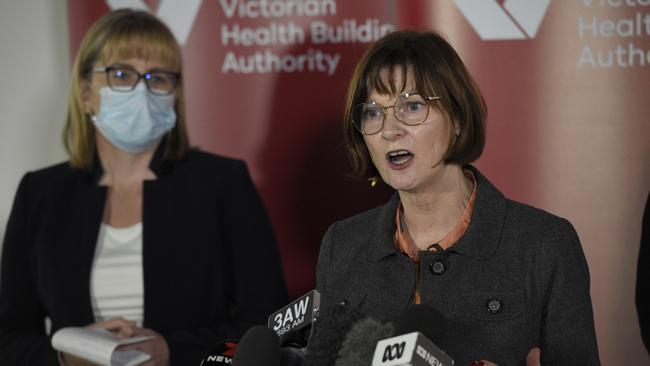
“In Victoria we do have a devolved system which enables our healthcare services to make the decisions that are best for them and the communities that they serve,” she told regional media.
“But they are absolutely backed in everyday by the Victorian government to deliver those health services.
“We stand with our hardworking healthcare workers and we are there to provide a range of support during this unprecedented and very challenging time.”
“It means we will, again, be moving wards around the health service to provide the capacity required over the coming weeks and months.”
Professor Way said he shared “genuine concerns about the quality of care we are able to provide and the consequence for our patients with deferred care”.
“I know as health professionals these are very difficult decisions,” he said.
“Unfortunately we do not get to choose when this pandemic ends. Though we do get to choose how we respond personally.”
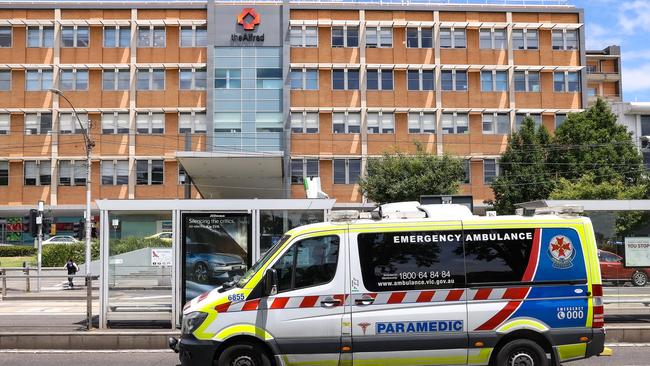
From Thursday, all visitors to facilities operated by The Alfred — including outpatients — will be asked to wear N95 masks.
Professor Way urged staff working in non-clinical areas to mask up and to discuss working from home alternatives.
“I know you are exhausted and ‘over’ being asked for more,” he added.
“I know this pandemic has asked too much. I know that words of thank you, don’t change the reality of your day.
“But I am grateful and will put in as many useful supports for you as we can.”
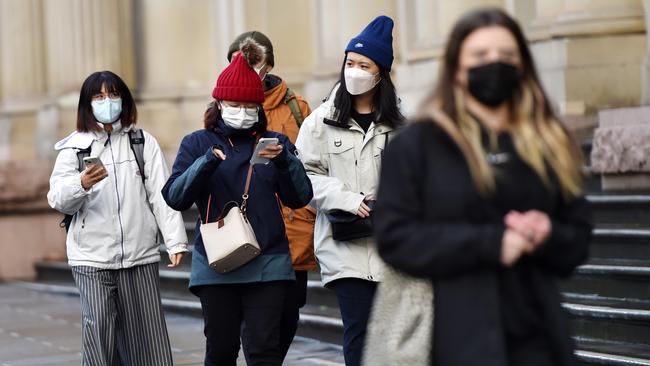
At a press conference on Thursday, Ms Allan said Victorian hospitals would continue to take a local approach and implement measures based on their own situation and capacity availability.
She insisted that approach was consistent and in line with the settings in hospitals across the country.
“Hospitals at a local level are going to make decisions, as they always have in the past, based on the circumstances of the day,” she said.
“There’s some broader advice about how to manage visitor restrictions … but those working closest to their patients or residents are indeed best placed to make that decision.
“There has been a huge amount of work preparing for this winter. There was every expectation that this winter would be challenging. We’re now experiencing that here in Victoria … and it is putting extra pressure.
“These are all factors that have to go into how local health settings can best manage this part of the pandemic. I do not diminish for a moment that this is a really big challenge.”
Asked if there was a number of Covid hospitalisations that would immediately trigger the cancellation of more surgeries, Ms Allan said: “It’s really based on availability on their local workforce. These are not measures taken lightly.”
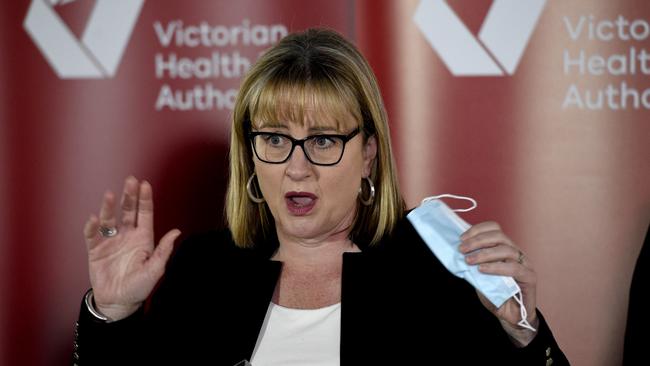
She refused to rule out the prospect of the government needing to declare a Code Brown, as was done in January this year.
“That’s speculating on a hypothetical … At this stage it’s premature to speculate on anything else that may come as a result of that because we have some advice … that we would expect to see a dip in daily hospitalisations as a result of Victorians following the advice from the minister that was issued on Tuesday.”
She also refused to say if the government would completely rule out the prospect of further mandates.
“You’re asking me to be drawn on a hypothetical … being asked to rule in or out hypotheticals is not going to help any one of those healthcare workers deal with the challenges they’re dealing with today.
“What we’ve got to focus on is giving that clear advice to the Victorian community – wearing masks indoors if you can’t isolate, going out and getting vaccinated if you’re eligible … that’s the best way to address the challenge of Covid that we’re being faced with at the moment.”
Meanwhile, the number of patients in hospital with Covid spiked again, with 771 Victorians undergoing treatment on Thursday.
Of those, 34 are receiving intensive care, with nine on a ventilator.
The state announced 11,283 new cases and 20 deaths.
Opposition health spokeswoman Georgie Crozier said having elective surgeries cut was a disaster for Victorians “languishing in pain”.
“It’s a disaster for tens of thousands of Victorians who are waiting for that vital surgery that they need,” she said.
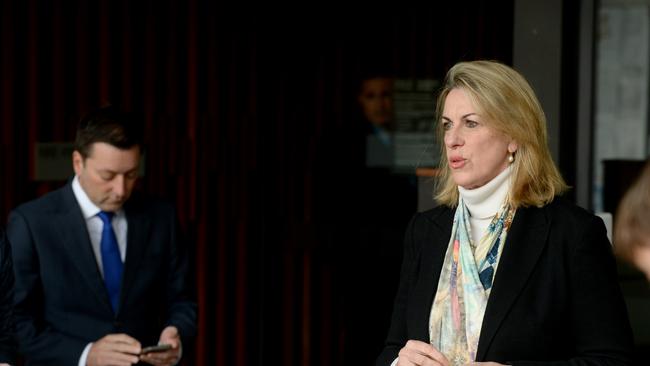
“We can’t have people languishing in pain and their health outcomes getting worse by the day.
“This is a really serious issue and the Andrews government is just walking away from what is happening.”
Ms Crozier said the deep-rooted issues of Victoria’s health crisis pre-dated Covid, with 50,000 Victorians on the elective surgery waiting list prior to the pandemic.
She said the current situation was “chaotic and confusing” and had led to the hospitals being left “high and dry” by the government.
“The government is pushing this back on to the hospitals. They’re not providing leadership, they’re not providing clarity and they’re certainly making it more confusing for hospitals,” she said.
“It shouldn’t have gotten to this. It shouldn’t have gotten to (a point) where our hospitals are grinding to a halt.
“It’s only got worse. This is years of mismanagement, a lack of investment and a lack of planning. Daniel Andrews cannot blame Covid for the crisis that we are in now.
“The government is lacking direction. They’re not providing what is needed for Victoria. They’re making excuses.”
Melbourne hospitals tighten visiting rules
At least five metropolitan hospitals have been forced to tighten visitor restrictions in recent days, as health services continue to come under pressure from escalating Covid cases.
The Austin, Royal Melbourne, Angliss, Box Hill, Maroondah and Healesville Hospitals have tightened visiting rules in the past week.
All stressed exemptions were in place for palliative care and patients who need extra support, such as a translator.
It comes as authorities warn a third Omicron wave will continue to increase cases and hospitalisations, which have already jumped by more than 50 per cent in the past fortnight.
Sonia Berton, whose mother is seriously unwell after suffering a stroke, said it was “chaos” at the Austin Hospital on Wednesday, when general visiting hours were reduced to two two-hour time frames.
“It took me 45 minutes to get in,” she said.
“It was so crammed, how is this protecting anybody? It was better off when they had visiting hours from 9am to 1pm and in that four hours, people could come and go.
“There would have been 100 people (in reception).”
An Austin Health spokeswoman said they understood it was a difficult changes for patients and families.
“As a result of the increasing number of Covid cases in the community, we’re again updating our visitor policy to help keep everyone safe,” she said.
A spokesman for Eastern Health – which runs Angliss, Box Hill, Maroondah and Healesville Hospital – said it was a “difficult” decision.
A Royal Melbourne Hospital spokesman said it needed to “keep staff, our patients and the community safe”.
The Health Department was contacted for comment.
Hospital code brown fears
The Andrews government has been urged to hand over health modelling related to a surge in winter infections after previously making such information public to justify its Covid restrictions and policies.
Opposition Leader Matthew Guy has dubbed Victoria “secretive” after it also refused to release a four-stage winter Covid plan drawn up by the Department of Health.
The document, which was sent to senior hospital figures as a guide, includes trigger points that would justify new restrictions such as cancelling leave periods for hospital staff and cutting elective surgeries.
Stage three of the plan, to be triggered when the state passes 800 Covid hospitalisations, would result in increased telehealth care appointments and cancelling hospital leave.
This week 739 Victorians are in hospital with the virus but only five require a ventilator to breathe.
Stage four, to be enacted after 1400 hospitalisations, would result in the government considering a code brown, which includes cancelling elective surgeries.
The government is also understood to have received new modelling from the Burnet Institute, but has refused to release it publicly.
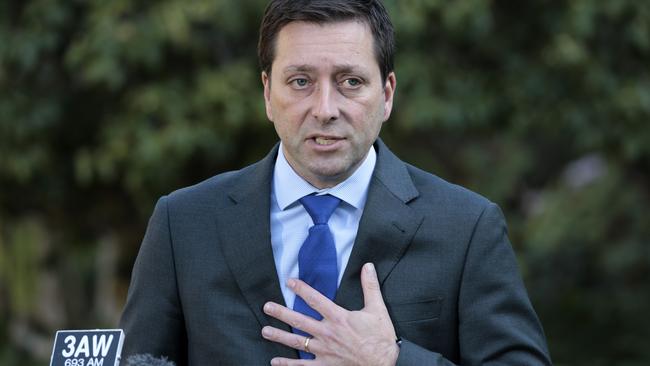
Burnet Institute deputy director Margaret Hellard said modelling suggested the current wave was likely to peak in mid to late August.
But at this stage, current predictions indicate it’s not likely to be as high as daily case numbers during the initial Omicron wave in December and January this year.
Australian Medical Association Victoria president Roderick McRae, who has viewed the health department document, said the government should be making both reports available to all.
“It’s problematic to know there’s a report out there, but it’s being withheld, causing an information gap and tainting anyone’s analysis of how they will ‘do the right thing’ even in their own circumstances,” he said. “Very broadly, the AMA supports full transparency.”
Dr McRae said if the modelling was “fantastic”, the government would be “handing it out to the media on a gold plate”. “The inference has got to be that it’s bad news and that it’ll put them in a bad light,” he said.
Mr Guy said the documents should be made public because Victorians deserved full transparency.
“Everything in this government is a secret. They won’t tell you anything, they won’t advise anything, they hide material from the parliament, they don’t answer questions,” he said.
“Whether it’s infrastructure projects, whether it’s health advice on Covid … everything to this government is a state secret and it shouldn’t be when it comes to our health.”
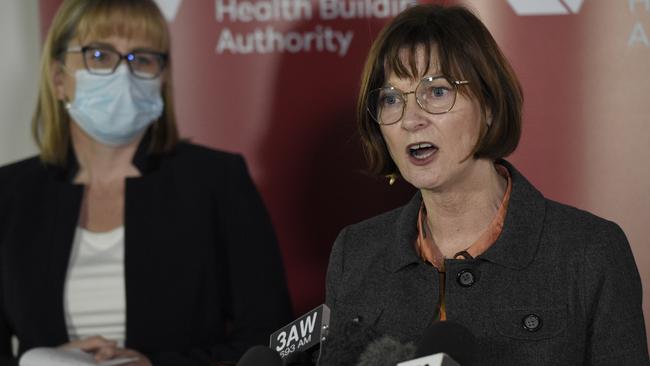
But senior minister Lily D’Ambrosio maintained she had not heard of the “secret modelling”.
Instead, she said “information is always updated, provided to our health services so they can always be prepared and plan for the future … that’s the normal business”.
A government spokeswoman said the next few months would be tough with “Covid demand not going away, rising flu cases and high numbers of patients presenting with respiratory issues, trauma or deferred care”.
“To help our hospitals navigate this challenging period, the department is working in collaboration with the health sector, to help best use resources, enable load balancing and assist in relieving system pressures within the public hospital system,” she said.
The peak of hospitalisations was in mid-January when the state had 1229 people in hospital and close to 130 in ICU, resulting in a code brown declaration.
That allows hospitals to redeploy their workforce to areas of greatest need, postpone leave to boost staffing numbers, and redistribute resources to ensure critical patients are prioritised.
The government insisted it had no plans to enact such a response, despite this week being told hospitalisations could rise to 200 admissions per day – or between 150 and 180 if mask-wearing increases.
“That is not under consideration,” Ms D’Ambriosio said. “The important thing is we have really strong advice on how we can keep safe.”
More schools urge pupils to mask up
Schools are now “strongly encouraging” students to wear masks at schools and handing out masks for those who do not have one, the Herald Sun can reveal.
Some private schools are also asking parents to wear masks on campus as schools battle growing outbreaks of Covid and flu infections.
Such measures are being seen as a possible return to mask mandates by individual schools, with one leader calling it a sensible proactive measure.
It comes as parents are receiving mixed messages, with the relaxation of rules allowing Covid-infected parents to drive their non-infectious children to school and pick them up.
A spokeswoman from the Department of Education said the “current advice to schools is that face masks are recommended in indoor settings”.
All schools have been supplied with a stock of N95 masks suitable for adults and older children; surgical masks for staff and students in secondary schools.
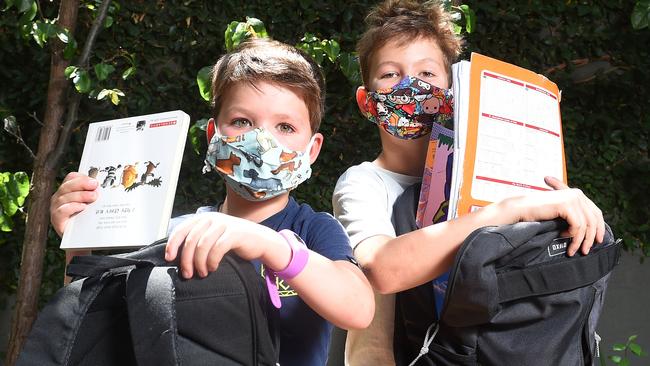
Last term, there was little expectation that students or staff wore masks unless they were close contacts.
Face masks, while recommended, were not required.
Schools taking a stronger stand on mask-wearing include Carey Grammar, which wrote to parents on Tuesday advising them: “In the interests of maintaining the safest possible learning environment for all at school, we are strongly recommending all students Year 3 and above wear a mask in all indoor settings.”
“We continue to have a large number of staff and students impacted by colds, the flu and Covid and think this is a prudent step for us to take to strongly encourage mask wearing whilst indoors at school,” principal Jonathan Walter said.
“Can I please ask that parents also wear a mask when attending campuses in indoor settings?”
Brighton’s Star of the Sea college is the latest school to encourage its students to don masks while on campus.
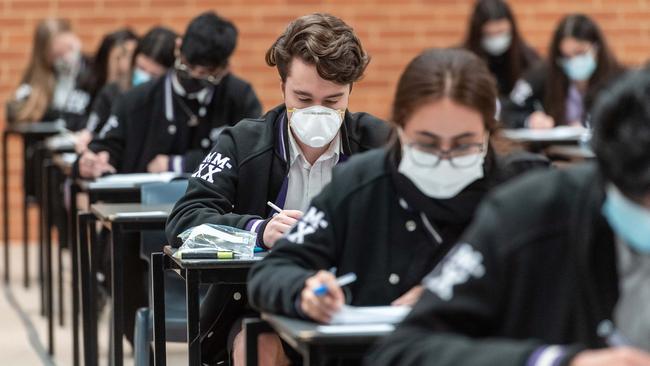
In a letter to parents on Monday, obtained by the Herald Sun, the independent Catholic girls’ school said it was preferred that students wore face coverings.
“With the increase in Covid cases in the community, we encourage all students to wear masks at school,” principal Mary O’Connor said.
“Public transport still requires masks to be worn.”
The school’s canteen, Nagle Cafe, was also forced to close this week due to staff illness.
In Geelong, St Joseph’s College principal Tony Paatsch said more than 300 students were absent from the Newtown school each day during the final two weeks of term two, as the region saw an explosion in flu and Covid cases.
Despite that, he said the school would continue to follow government advice and would not yet introduce a mask mandate.
“We have no plans to return to remote learning and while it is becoming more difficult to replace absent teachers, our staff continue to be exceptionally generous and committed and we expect to be able to continue to have a teacher in each class,” he said.
Another expert pushes for mask mandate
The head of the Doherty Institute says the return of mask mandates should be considered, given the pressure surging Covid cases is having on hospitals.
Ms Lewin, a leading infectious diseases expert who helped draw up last year’s road map out of lockdown, said she understood Australians were suffering Covid fatigue.
But she said the pandemic was not over and governments should strongly consider reintroducing measures such as mask mandates for indoor settings if voluntary compliance around mask wearing does not increase.
“Mandates should be considered,” Professor Lewin told ABC Radio National on Wednesday morning.
“It worked very well previously, it won’t be for a long time.
“Everyone should be aware that masks indoors when we have got this amount of Covid will be another additional help.”
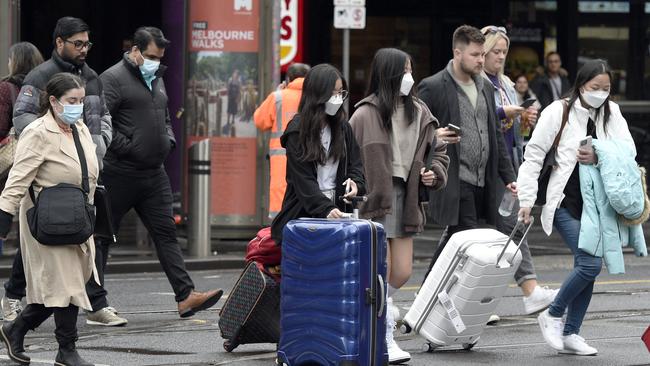
Professor Lewin also called on the government to “rethink” the move to phase out free RATs for concession card holders from August 1.
“I am hoping they will reconsider this,” she said.
“I understand the policy was laid down many months ago but we need to be flexible and pull out whatever we can do when cases surge as is happening now.”
Prof Lewin said restrictions such as mask mandates would help hospitals from being overwhelmed during winter.
“There is no question about that (the need for restrictions) as we see hospitalisations rise,” she said.
“That (hospitalisations) have real knock-on effects for the whole community because of the restrictions that are going to happen to hospitals once we get too many people in hospitals.”
End of free RATs run draws fire
The Albanese government’s decision to not extend subsidised Rapid Antigen Tests for concession card holders despite rising Covid cases, has come under fire.
Introduced in late January, the program entitled concession card holders to 10 free tests across three months and is scheduled to end on July 31.
Chemist Warehouse director Mario Tascone said demand for subsidised tests last week was “as high as it has ever been” since the program launched.
“Given the circumstances and the amount of Covid out in the community at this time, I find it a bit surprising,” he said.
“If it made sense to have the program in February, it makes just as much sense to have it while we’re in a big wave now.”
He said prices per test had dropped from about $10 in January to $8 now, but this was still expensive for many pensioners.
“The over-70s, are the most at risk,” he said.
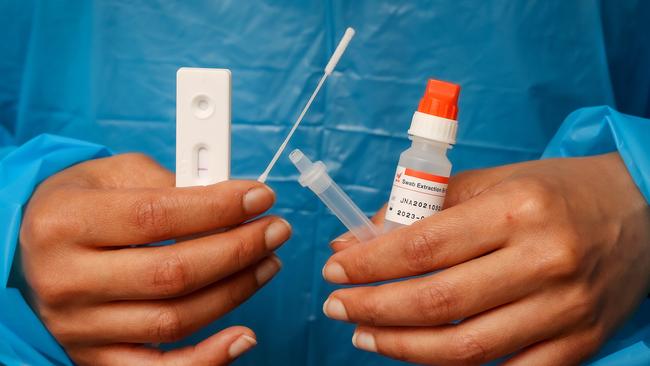
Council for Older Australians chief executive Ian Yates said they were concerned about the impact of cost of living and will lobby the government to extend the subsidy through winter.
Federal Health Minister Mark Butler said the program was set up when it was “borderline impossible” to find RATS and they cost “close to $30”.
“Prices have come down significantly,” he said.
“The Morrison government and state governments designed this program to end on 31 July.”
“I would encourage pensioners and concession cardholders to get their allocation of up to 10 tests before the end of this month.
“After this, there are state and territory schemes available, along with free tests that continue to be offered in specific settings including aged care and schools.”
It comes after the federal government’s Covid sick leave payment ended on June 30.
Trade unions are demanding the Albanese government reinstate the $750 per week pandemic leave payments.
Australian Manufacturing Workers‘ Union National Secretary Steve Murphy said the government needed to act on its promise to protect essential workers.
Mixed reaction to minister’s admission
Businesses on Tuesday welcomed the Victorian government’s decision to stay away from increased mask mandates, but critics have labelled the move as being about “politics, not health”.
Health Minister Mary-Anne Thomas on Tuesday revealed she rejected advice from the acting chief health officer Ben Cowie to extend mask mandates, instead urging employers to let staff work from home where appropriate.
She also announced that people would now be exempt from testing and isolating four weeks after getting Covid, instead of 12 weeks, due to new evidence about new variants being able to evade immunity.
“I have chosen not to extend mandates for mask-wearing in some of the settings that were recommended to me,” she said. “We need to empower Victorians to make their own decisions.”
But Opposition Leader Matthew Guy said Ms Thomas’s refusal to implement health advice showed Labor was “all about politics” ahead of the November election.
“Instead of preparing our health system, Daniel Andrews is still playing political games with Covid,” he said.
Australia’s former deputy chief medical officer Nick Coatsworth said Victoria’s hospital crisis had been “years in the making” and there needed to be a greater focus on Covid patients needing ventilation rather than admissions.
“I think the overall tally of people in hospital (with Covid) is not a good marker for burden of disease. It does present challenges to hospitals with infection control and bed flow and is definitely contributing to the current health system capacity issues,” he said.
Australian Industry Group Victorian head Tim Piper welcomed the decision not to introduce mask mandates, as did Victorian Chamber of Commerce and Industry chief Paul Guerra, who said it “puts the decision-making back on the individual and businesses”.
Australian Medical Association Victoria president Roderick McRae said cutbacks to elective surgery were “extremely likely”, adding: “Things are very bad.”
— Additional reporting: Michaela Meade, John Dagge and Sarah Booth




